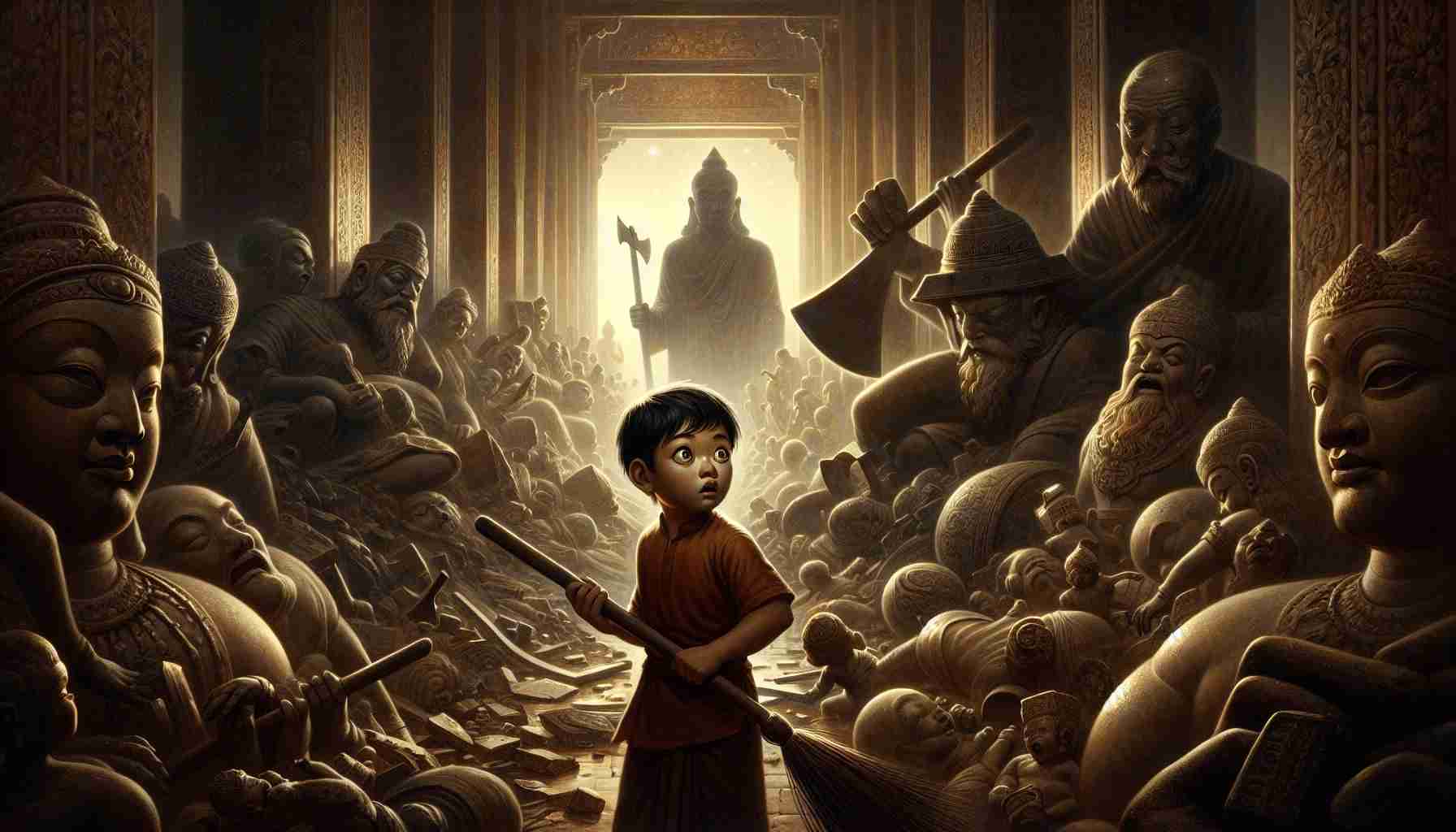

The clay idols loomed above him—silent, painted faces staring down from their pedestals. They said nothing. They did nothing. But the people feared them like gods.
Ibrahim was just a boy when he first asked the question aloud. “Why do you worship what cannot speak, cannot see, cannot help you at all?” His father, Azar, silenced him with a warning stare. But the question stayed.
Years passed. The idols multiplied. So did the festivals. On these days, the people paraded their statues through the streets, offering decorated fruits, polished stones, and whispered prayers. Ibrahim watched with a heart that ached. Not just because of the empty rituals, but because deep inside, he knew—there was only one true God. One who created the stars and the sun, the trees and the breath in his lungs.
That truth burned in him like a fire. And eventually, it demanded to be seen.
It was early morning when the town emptied for the festival, traveling to the fields outside the city. Ibrahim stayed behind. He walked into the temple, its stone floor cold beneath his feet, and faced the rows of lifeless idols. He picked up an axe and did what no one dared to.
When the people returned, their shrieks filled the air. The idols lay shattered, limbs and faces torn apart—except for the largest. To that one, Ibrahim had tied the axe.
“Who did this?” they demanded.
Ibrahim faced them calmly. “Ask the big one,” he said. “He has the axe.”
They laughed bitterly. “You know the idols cannot speak.”
Exactly, Ibrahim thought. But he let the moment hang in the silence.
Fury replaced confusion. Belief, when challenged, often clings tightly to pride. They grabbed him, shouting over one another. “Burn him! We must protect our gods!”
So they built it. A fire unlike anything the town had ever seen before. Logs piled high like a wall, flames reaching for the sky. The heat was unbearable even from a distance.
They tied Ibrahim down. And when the fire roared its loudest, they hurled him in.
But he did not burn.
Allah ﷻ, the one true God, commanded the fire, saying, “O fire, be coolness and safety for Ibrahim.” (Qur’an 21:69)
And so it was.
The flames bowed to their Creator. Ibrahim walked out—unharmed, untouched.
The crowd fell silent. Not because they believed. Some hearts, even after witnessing miracles, choose blindness. But others—others could not forget what they saw. A boy thrown to fire for rejecting false gods… and the fire obeyed him.
That night, as stars cut through the sky above his quiet town, Ibrahim looked up.
No statue. No idol.
Just the open heavens. The Maker of it all.
He knew he was alone among his people. But he was not alone with Allah ﷻ. And that was enough.
Because sometimes, standing in truth means standing alone. But if you're standing with Allah ﷻ, you are never really alone.
The clay idols loomed above him—silent, painted faces staring down from their pedestals. They said nothing. They did nothing. But the people feared them like gods.
Ibrahim was just a boy when he first asked the question aloud. “Why do you worship what cannot speak, cannot see, cannot help you at all?” His father, Azar, silenced him with a warning stare. But the question stayed.
Years passed. The idols multiplied. So did the festivals. On these days, the people paraded their statues through the streets, offering decorated fruits, polished stones, and whispered prayers. Ibrahim watched with a heart that ached. Not just because of the empty rituals, but because deep inside, he knew—there was only one true God. One who created the stars and the sun, the trees and the breath in his lungs.
That truth burned in him like a fire. And eventually, it demanded to be seen.
It was early morning when the town emptied for the festival, traveling to the fields outside the city. Ibrahim stayed behind. He walked into the temple, its stone floor cold beneath his feet, and faced the rows of lifeless idols. He picked up an axe and did what no one dared to.
When the people returned, their shrieks filled the air. The idols lay shattered, limbs and faces torn apart—except for the largest. To that one, Ibrahim had tied the axe.
“Who did this?” they demanded.
Ibrahim faced them calmly. “Ask the big one,” he said. “He has the axe.”
They laughed bitterly. “You know the idols cannot speak.”
Exactly, Ibrahim thought. But he let the moment hang in the silence.
Fury replaced confusion. Belief, when challenged, often clings tightly to pride. They grabbed him, shouting over one another. “Burn him! We must protect our gods!”
So they built it. A fire unlike anything the town had ever seen before. Logs piled high like a wall, flames reaching for the sky. The heat was unbearable even from a distance.
They tied Ibrahim down. And when the fire roared its loudest, they hurled him in.
But he did not burn.
Allah ﷻ, the one true God, commanded the fire, saying, “O fire, be coolness and safety for Ibrahim.” (Qur’an 21:69)
And so it was.
The flames bowed to their Creator. Ibrahim walked out—unharmed, untouched.
The crowd fell silent. Not because they believed. Some hearts, even after witnessing miracles, choose blindness. But others—others could not forget what they saw. A boy thrown to fire for rejecting false gods… and the fire obeyed him.
That night, as stars cut through the sky above his quiet town, Ibrahim looked up.
No statue. No idol.
Just the open heavens. The Maker of it all.
He knew he was alone among his people. But he was not alone with Allah ﷻ. And that was enough.
Because sometimes, standing in truth means standing alone. But if you're standing with Allah ﷻ, you are never really alone.